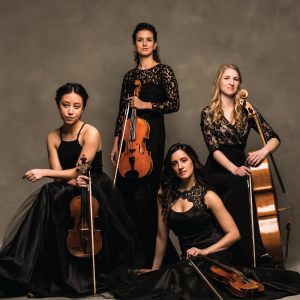For the Chicago-based KAIA String Quartet, honoring Latin America’s rich musical history and culture goes beyond a chosen style–it is a mission. That mission continues with their WVIK/QCSO Signature Series performance on March 31 at the Boys & Girls Club Teen Center in Moline, IL.
KAIA’s QCSO performance is made possible through a $10,000 Challenge America grant from the National Endowment for the Arts. The grant support projects that extend the reach of the arts to underserved populations—those whose opportunities to experience the arts are limited by geography, ethnicity, economics, or disability
Tackling Complex Rhythms
The program begins with Javier Alvarez’s Metro Chabacano. Named after a train station located in the Cuauhtémoc borough of Mexico City, the piece chugs along with the beat of a train. It flows in and out with moments of intensity, reflecting the chaos of a commute in a busy city.
Often described as urban and vigorous in sound, Alvarez hoped to portray a city that runs smoothly with little interruption. Composed in 1991, It is the most recent piece within KAIA’s program.
“There are a lot of complex rhythms going on in this piece,” said KAIA Cellist Hope Shepherd DeCelle. “You can actually hear the train. It’s a lot of fun for us to perform.”
But tackling rhythmic complexity is hardly an issue for KAIA. The quartet is well-seasoned, especially after touring in Uruguay and Argentina to promote their latest album, QUARTANGO. They’ve also collaborated with Grammy award winner Raúl Jaurena and appeared with Grammy award winner Paquito D’Rivera on NPR’s New Year’s Eve “Toast of the Nation.”
A Stew with 30 Different Spices
Next in the program is Silvestre Revueltas’ String Quartet No. 2. Completed by Revueltas in 1931, the piece consists of three unique movements and was dedicated to his former lover, Aurora Murguía.
QCSO Executive Director Brian Baxter says the piece is, “Edgy, exciting, and totally engaging.”
KAIA Violinist Victoria Moreira agrees, finding the Revueltas piece to be her favorite.
“It might not be the audience’s favorite, but I love the Revueltas string quartet,” Moreira said. “Revueltas is a more modern composer. He managed to take all these folk elements from Mexican music and put it into his writing. You get to hear the full potential of each instrument. It’s like a stew with 30 different spices.”
Moreira’s comparison extends beyond simply the Revueltas piece. While the program consists of exclusively Mexican composers, the difference in sound and style among each paint unique pictures of an evolving Mexico.
“When we do a program that only focuses on one country, we can see how that country evolved from the music,” Moreira said. “A lot of the composers we’re playing are trying to portray something very typical of Mexico, but they’re doing it in a different way. These pieces are very different from each other, but all share the same mission of representing the culture of Mexico.”
A KAIA First with Chávez
 Following Revueltas is Miguel Bernal Jiménez’s Cuarteto Virreinal completed in 1937. Jiménez was a key influence in the Mexican nationalist music movement, often focusing on largely religious themes.
Following Revueltas is Miguel Bernal Jiménez’s Cuarteto Virreinal completed in 1937. Jiménez was a key influence in the Mexican nationalist music movement, often focusing on largely religious themes.
Lastly is Carlos Chávez’s String Quartet No. 1. Heavily inspired by native Mexican culture, Chávez completed this piece in 1921. Not only does the piece reflect an indigenous side of Mexican culture, its performance will mark a historical first for KAIA.
“This will be the first time we’ve performed the entire quartet,” said KAIA Violinist Naomi Culp. “The piece is so beautiful, and it’s very exciting for us to be able to bring it to life.”
Taking Risks with Music
Ultimately KAIA’s performance will not only dazzle the audience, but potentially teach attendees with Hispanic heritage about the rich culture and music that so greatly influenced Latin American history.
And that, says Baxter, is the exact purpose of the NEA Challenge America grant.
“Federal support from the NEA like this is vital to us and to thousands of arts non-profits around the country,” Baxter said. “These grants incentivize risk-taking. Without them, developing new approaches to serving our community would likely be more difficult.”
Moreira agrees. “The world and the arts are in a kind of a crisis,” she said. “And non-profit organizations that work towards improving the quality and accessibility to art and making music—there’s a huge value to those organizations. We’re always very happy to be a part of what they’re trying to achieve.”
EVENT DETAILS
WVIK/QCSO Signature Series III: KAIA String Quartet
March 31, 2019 | 2:00 p.m.
Boys & Girls Club Tean Center
1122 5th Ave. | Moline, IL
Purchase Tickets | $25 Adults | $10 Students
Featuring
Victoria Moreira, violin
Naomi Culp, violin
Amanda Grimm, viola
Hope Shepherd DeCelle, cello


